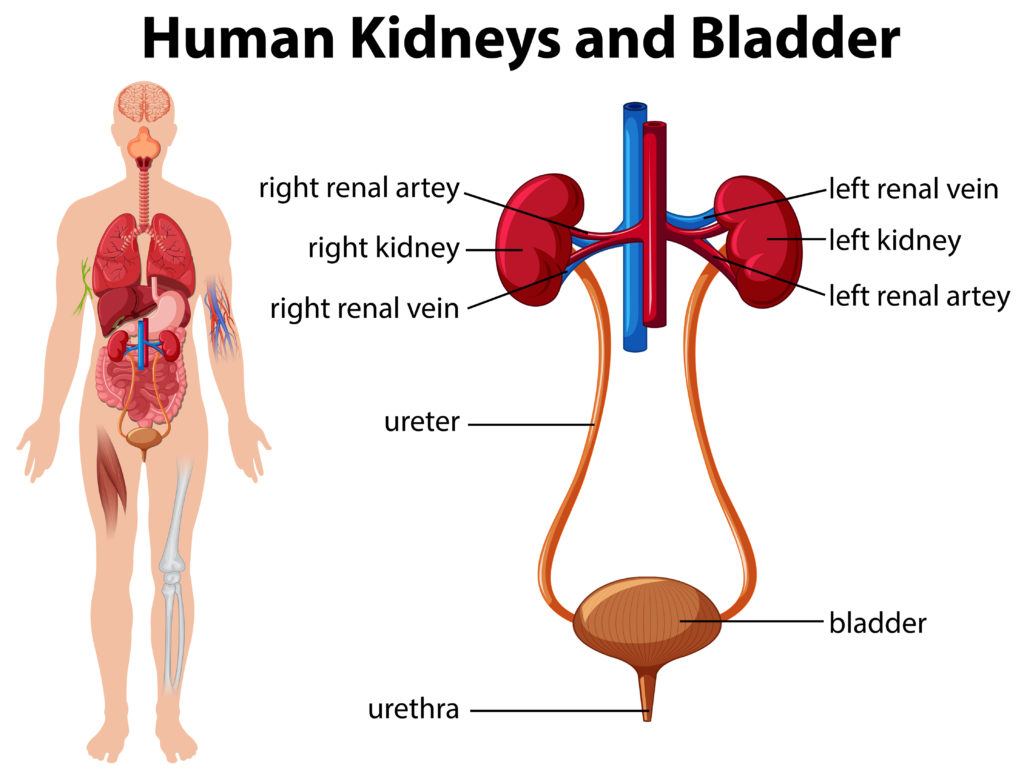There are various salts and minerals found in urine, if there are more minerals than the body can get rid of then they form crystals which over time can build up and form a kidney stone. Stones can form in any part of the urinary tract and are quite common. Kidney stones can vary greatly in size from the size of a grain of sand to a pearl or even to the size of a golf ball. They are often painless when in the kidney but can cause severe pain when they pass from the kidneys to the bladder.
Your body has two kidneys one on each side of your abdomen, they are shaped like a bean. Each kidney is about the size of fist, the kidneys make urine, which then drains down the tubes (ureter’s) and into the bladder. The bladder then stores the urine until you pass it through the urethra when you go to the toilet. The kidneys jobs are to filter the blood of toxins and to produce urine to get rid of waste products from the body.

The cause of most stones is usually unknown though certain factors such as a family history, taking certain medications such as aspirin, certain antibiotics and some HIV medications might put you more at risk. You are also more likely to develop kidney stones if you are a man or if you only have 1 kidney. You are also more at risk of kidney stones if you have uncontrolled diabetes or if you are overweight.
There are 4 different types of kidney stones they are as follows:
Some kidney stones may cause no symptoms and many people never know they have them. Kidney stones usually only cause symptoms when they become large enough to interfere with the normal flow of urine, when they travel out of the kidneys or when they cause an infection. Symptoms of a kidney stone can be quite sudden and cause intense pain, usually concentrated on one side of the back but may move into the stomach or down to the groin. This pain can be accompanied by nausea or vomiting. You may also have symptoms of a kidney infection such as a fever, pain on urination, blood in the urine and needing to go to more often. For more information on kidney infections click here.
Your doctor will examine you and ask about your symptoms, in many cases describing your pain to your doctor may be enough to diagnose stones. However an x-ray or CT scan may be required to reveal the size and location of the stone. Once a kidney stone diagnosis has been confirmed you may require blood tests to identify why the stone has formed. A detailed urine test may also be carried out to look for signs of dehydration and infection.
Most kidney stones are small and so will be excreted with urine within hours or days, you should collect the stone to give to your GP so it can be analysed to find the cause. This can be done by using a tea strainer, coffee filter paper or nylon stocking when passing urine. You may need to take painkillers such as ibuprofen to ease the pain. In some cases pain can be so intense you may need to be admitted to hospital for strong pain relief.
If the kidney stone is too large to come out by itself or the pain continues then you may require a different form of treatment. There are different treatment options available depending on the size and type of stone. Treatment options are as follows:
If none of these methods are possible then traditional surgery may be an option.
To avoid kidney stones developing make sure you always drink enough fluids especially on hot days and after exercise. Try to take a glass of water to bed to help dilute the urine over night. Avoid sugary drinks such as cola and fruit juices. If you have had a kidney stone and you want to prevent further ones your doctor can offer dietary advise based on the cause of the stone. For example if your kidney stone is caused by calcium you may be advised to reduce the amounts of food you consume containing oxalates. Common foods that contain oxalates include, beetroot, asparagus, chocolate, almonds, cashew nuts, peanuts, sweet potatoes and grains such as oatmeal. It is also advisable to lower the amount of salt you consume.